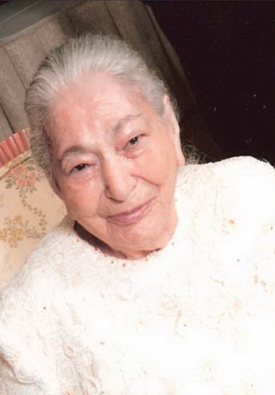
Dr. Azizeh Bral was born in the late summer of 1921 C.E. to a religious Jewish family of Tehran.
Her father, Yehezghel “Ezekiel” Bral, was one of the land-owners of the Jewish community, and her mother, Golin Abir, was a woman of grand thought and selfless sacrifice. Her mother died at the young age of 43, leaving Azizeh, her four brothers and her sister to the care of their elder sister, Mohtaram, whose remarkable wisdom left a significant impact on the siblings and their higher education.
Azizeh Bral finished her elementary and junior high studies at the Alliance Israélite “Ettehad” Schools, and completed high school studies at the Azarm High School. In 1938, she was accepted to Tehran University, where she graduated in 1943 with Honors in Pharmacology, making her officially the first Iranian Jewish woman to receive her Doctorate degree in this field.
Azizeh Bral married his paternal cousin, Nasser Bral in 1945, and together they brought two daughters and a son to the world.
After the birth of her first child, she left behind eight years of work experience at Ray Pharmacy, Tehran, owned by her brother Mousa Bral, also the Jewish Community Representative in the 4th National Parliament of Iran. She resigned for she chose to spend her life not in the pursuit of wealth, but rather in aiding humanitarian and charity affairs, especially to help impoverished children. In her interviews and memoirs, reflected in print and in the media, she said that what motivated her in choosing this path was how she had felt in the school days toward her classmates. Time after time, she had seen how poverty and other deprivations forced children to give up their education.
Dr. Azizeh Bral believed that even poor talented students should have their chance and be accepted to study at universities. Encouraged and supported by her husband and her sister Ehteram, she began work as a Social Worker at the Rouhi-Shad Jewish School, located in the Darvazeh Dowlat area of Tehran. In 1960, with her initiation and cooperation, the Board of the Rouhi Shad School and Synagogue, organized a fundraiser event for Jewish families at the Talar-e Farhang, the proceeds of which were spent on the remodeling and expansion of the school. Subsequently, the office of Hatef Humanitarian Affairs was formed and dedicated to Dr. Bral to pursue her welfare work.
 Before long, Dr. Bral enlisted the help of a few benevolent friends who were interested in this line of service, among them Nik-khah “Mah Sultan” Elghanian, Ms. Ne’dar, and Touba Shamekh, to establish Hatef Women’s Organization, and together, they officially began to do non-profit work across the society.
Before long, Dr. Bral enlisted the help of a few benevolent friends who were interested in this line of service, among them Nik-khah “Mah Sultan” Elghanian, Ms. Ne’dar, and Touba Shamekh, to establish Hatef Women’s Organization, and together, they officially began to do non-profit work across the society.
Dr. Azizeh Bral, like a guardian angel, dedicated her entire life selflessly to cultural services. As a founding member and the president of Hatef Women’s Organization, she became one of the active centers of aid and support for many Iranian Jewish families in Tehran and other cities.
For years, she more than fulfilled her mission, “to guide the thoughts and promote the culture”, which was also a connotation of the word “hatef”, one who calls out to inform. Dr. Bral spent her entire energy within the framework of serving the community, providing educational facilities, and encouraging the children of impoverished families to pursue education. This was captured in the motto of Hatef Women’s organization, that “financial deprivation must not deprive children of their education.”
In 1966, Hatef Women’s Organization was registered as No. 1113 at the Ministry of State as a nonprofit humanitarian organization. One of Dr. Bral’s initiatives was to organize parties and events to recognize outstanding students of Jewish schools and help them get to know one another. The proceeds of the events were mostly spent on charity affairs, such as helping the poor in their education, or providing them with the means for marriage.
The movement received far and wide recognition, and it was noted by a large number of social leaders and educators. Particularly, American Jewish Joint, known as Joint or JDC for short, a non-profit relief organization, asked in for direct cooperation, and to cover up to 75% of Hatef’s public welfare expenses.
Thus, Hatef Organization, already giving away donations and awards, enlisted the cooperation of the Beroukhim Institute to supply textbooks, notebooks, and other stationery to poor students. Before long, they were covering more than 25 Jewish schools; and shortly afterwards, they extended their aid and support to non-Jewish schools, as well.
Next, Joint recommended that Hatef Organization should begin also to assist university students, and that Joint would cover the expenses. Thence, according to the statistics of Hatef Organization, they managed to cover between 60 to 80 students per year, a total of 600 over the years, in financial assistance or enrollment rights at schools and universities. Moreover, they paid interest-free loans to a significant number of illiterate people. At that point, Farrokh-roo Parsa, then Minister of Education, offered help to accelerate and expand their humanitarian activities to include non-Jewish schools, as well. Besides, Dr. Bral was assigned the responsibility for The Committee for the Education of Gifted Children in Impoverished Neighborhoods, which was under the direct supervision of Farrokh-roo Parsa.
The persistent and productive services of Dr. Bral led the Capital’s Women’s Organization to invite her for membership as their Jewish women’s representative and to cooperate in extended activities. Years later, the Iranian Women’s Organization would recognize Dr. Bral with an Honorary Award for her ten years of voluntary services as a social worker at the Railroad kiosk. Furthermore, the membership of Hatef Organization in the League of Humanitarian Servants, which was supervised by Asadollah A’lam, then the Court Minister, opened up a considerably significant opportunity before the organization and the Jewish community at large.
During those years, the number of social workers at Hatef Organization continued to increase. A number of them served as the Council of Hatef in the Oudlajan neighborhood, “the Jewish ghetto” of Tehran, at Gorgan Street. Even some of the students of other educational centers spent their internship period by collaborating with the Hatef Council at the Oudlajan.
In 1967, Hatef Women’s Organization intent on promoting the Jewish language among all sectors of the Jewish community, joined hands with the Safi Ali-Shah Publication, directed by Moshfegh Hamedani, to publish and distribute a multitude of small Hebrew-English and English-Hebrew dictionaries for free to those interested in learning the language.
In 1963, among her outstanding achievements as the president of the Hatef Organization, Dr. Bral also established the Jewish elderly care house in Tehran, known as Khaneyeh Salmandan. At the time, the Jewish community of Iran could not appreciate this initiative nearly enough. As such, in its early years, only those who were hard to be cared at home, or who had no one to do so, were brought in to the center. The set back, however, did not disappoint this philanthropist in pursuing her compassionate goals. Thus, with much persistent effort, support was provided to cover the transportation means and expenses of the elderly and the handicapped. Further, with help from the social workers of Hatef Organization, weekly remote services were offered to take care of the handicapped elderly, help attend their hygiene, and as needed, bathe them at their homes.
Dr. Bral’s innovations also included a system to produce statistics and keep files and portfolios on the conditions of the impoverished or parentless families. Indeed, this task was carried out in Iran for the first time by the collaboration of Hatef Women’s Organization, support from the American Joint, and the cooperation of the Social Affairs Council, a subsidiary of Tehran Jewish Association. Basically, once a family asked for financial assistance, a case was opened, and it was processed immediately to do what was needed and offer them aid and support as soon as possible.
Following the 1979 Islamic Revolution in Iran, and despite her wishes, Dr. Azizeh Bral had to leave her birthplace and all that connected her to the land, and to immigrate to the United States. Once settled in Los Angeles, despite the visible marks of age and fatigue, she did not pause, for the flame of philanthropy and the quest of God burned still in the depth of her being. She took part in many social affairs and continued her benevolent services. Dr. Bral was a member of the Executive Board of Iranian Jewish Federation, a member of the B’nei B’rith Women’s Foundation, a.k.a. The Fariborz Matloub Foundation, and collaborator of the Iranian Jewish Senior Care Center, L.A., all of which expedite her goals. As before, she spent her entire time for the Jewish community, selflessly, generously and voluntarily, without the least interest in wealth or rank.
In May 2004, the Women’s Group of the Iranian American Jewish Federation, L.A., organized an event at the Federation’s center to celebrate and honor Dr. Azizeh Bral for her years of humanitarian services. During the ceremony, which was attended by a large number of prominent Jewish figures, Dr. Bral was praised by a number of educators, writers, and the heads of various cultural, social and religious organizations, for her sixty years of selfless services toward the Jewish community and the greater society.
Dr. Azizeh Bral died in 2008, at the age of 88


 فارسی
فارسی